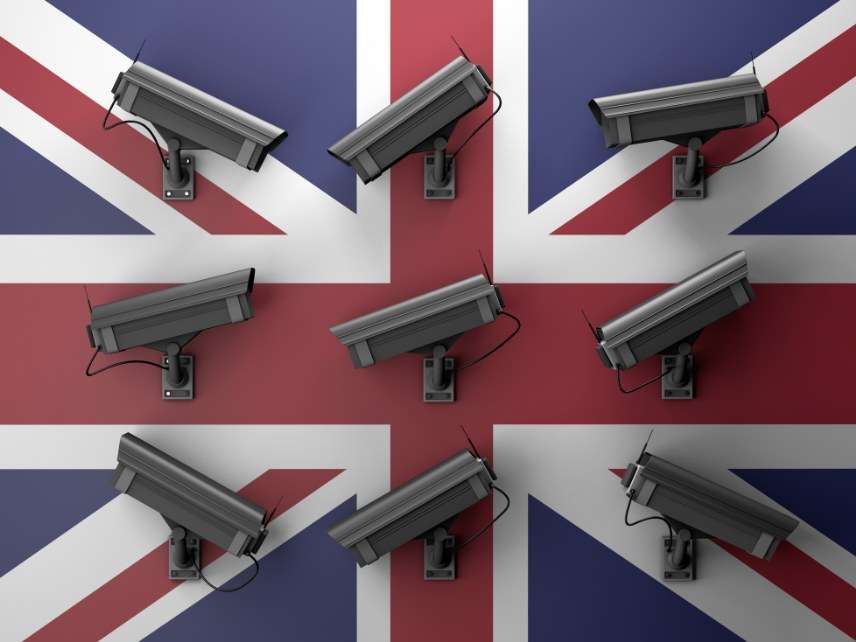British Group Fighting Secret Government Surveillance Subjected to Secret British Government Surveillance
U.K. government officials insisted they didn't collect and store communications data of Privacy International. Turns out they did.

Privacy International, based out of London, is an advocacy group that "envisions a world in which the right to privacy is protected, respected, and fulfilled." It has been engaged in activism and legal challenges opposing mass surveillance and the collection of citizens' data in the United Kingdom and countries across the world.
In an Orwellian twist, the group discovered this week that the British government has been secretly collecting and looking at their private data.
Privacy International was one of the activist groups that legally challenged the bulk surveillance conducted by the U.K. government, and which had been revealed by U.S. whistleblower Edward Snowden. A couple of weeks ago, the European Court of Human Rights, of which the U.K. is a member, validated Snowden's warnings by ruling that the U.K.'s mass collection of citizens' online metadata was a violation of their privacy rights.
On Tuesday, Privacy International was informed during a hearing over this legal challenge that MI5, England's domestic intelligence and security agency, had unlawfully collected and held their data. MI5 also acknowledged that communications data they'd gathered had been accessed and viewed by MI5 personnel.
All this matters because the government previously said it had not kept the data it had collected. Then, defenders of this mass data collection conceded that, sure, they were collecting and storing all this info for a while, but they weren't accessing or looking at it without good reason or without following proper safeguards. None of this turned out to be true. The Register, a U.K.-based site that reports on information technology, notes:
MI5's admission was the focus of today's proceedings because it had initially said it held no such data on the charity pre-avowal—but last year amended its position.
Moreover, the discovery of that data has exposed a previously unknown cache of information that officers have amassed while working on cases—and one that MI5 admitted lacked the safeguards that exist for other regimes.
In court, Privacy International's counsel, Thomas De la Mare, equated the situation to an "MI5 sofa".
The agency initially "had a look under the cushions" and found nothing, he said, but when it later poked down the back it dug up "a whole bunch of data" about his clients.
The explanation of how this all happened gets a little technical and complicated—there is a stage of intelligence gathering that lacked processes for review, retention, and deletion. And so it's apparently not even clear to the government what data they had in their possession or how they handled it. Privacy International is now demanding to know how and why, exactly, MI5 could claim it did not possess or access data that it did, in fact, possess and access.
Ultimately, the big takeaway here is that the lack of transparency surrounding data collection and mass surveillance allows for both sinister abuses and actual mistakes to occur, and then go unnoticed for years.
It's also your regular reminder that secret surveillance tools have historically been used to keep tabs on people who are critical of government behavior, not just folks believed to have criminal aspirations or terrorist connections.
Editor's Note: As of February 29, 2024, commenting privileges on reason.com posts are limited to Reason Plus subscribers. Past commenters are grandfathered in for a temporary period. Subscribe here to preserve your ability to comment. Your Reason Plus subscription also gives you an ad-free version of reason.com, along with full access to the digital edition and archives of Reason magazine. We request that comments be civil and on-topic. We do not moderate or assume any responsibility for comments, which are owned by the readers who post them. Comments do not represent the views of reason.com or Reason Foundation. We reserve the right to delete any comment and ban commenters for any reason at any time. Comments may only be edited within 5 minutes of posting. Report abuses.
Please to post comments


The UK population in general doesn't care and won't do anything. They have fully bought in.
Sadly this is true.
Can't have privacy without the government reviewing your privates to make sure your privacy is protected
is it Orwellian if everyone in the solar system would have assumed as such?
Feature, not bug. Intended purpose, not claimed purpose. Demonstrated preference. Etc.
The EU court didn't validate squat. Snowden was validated when he spilled the beans and Obama chased him to Russia rather than throw Clapper in jail.
It's not even secret surveillance anymore, everyone knows about it they just don't give a flying fuck about it. Because if you don't have anything to hide, you obviously don't have anything to fear. Nevermind that everyone commits a few felonies every day, or whatever they call them in Britain.
Just because you're paranoid doesn't mean they're not out to get you.